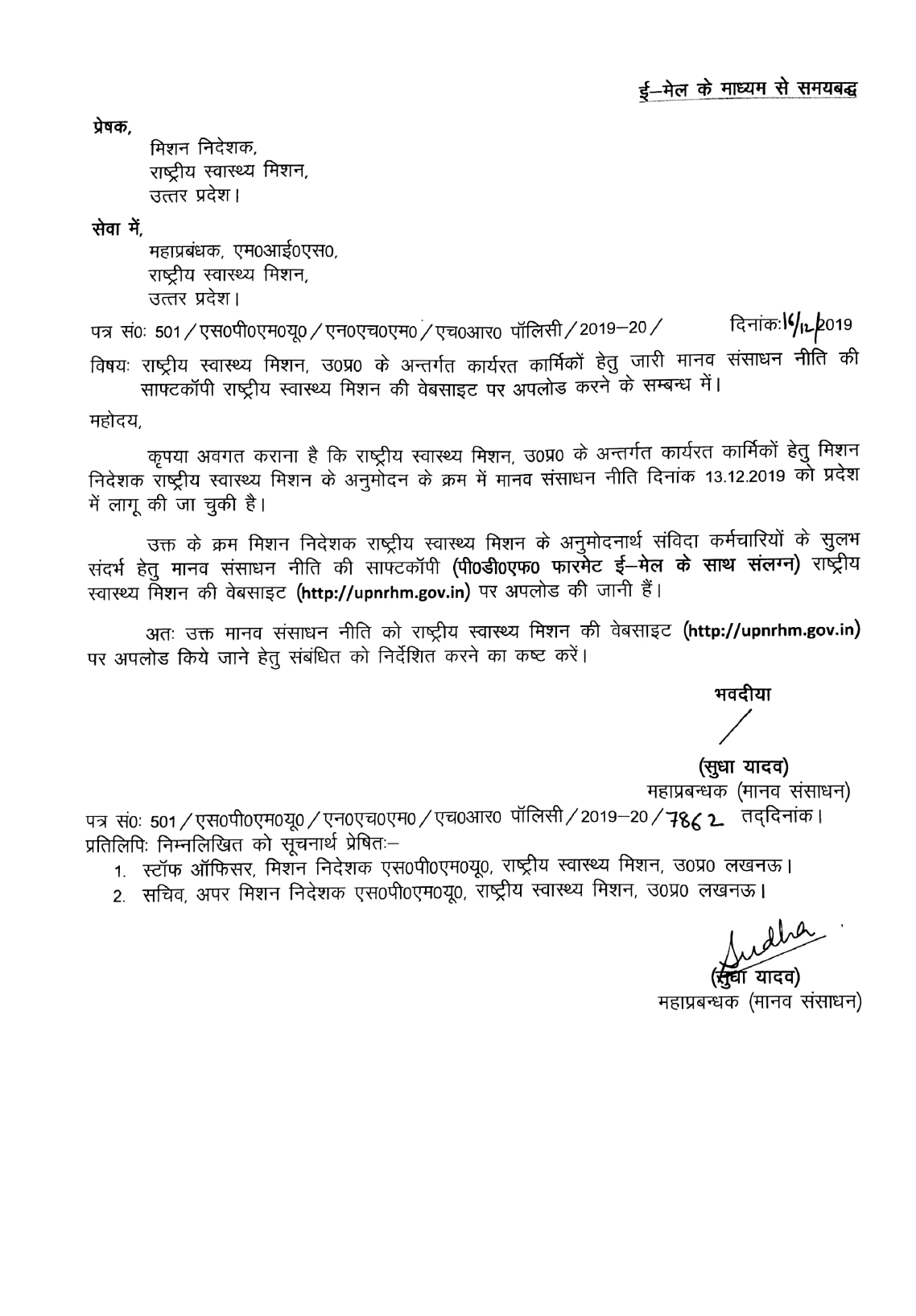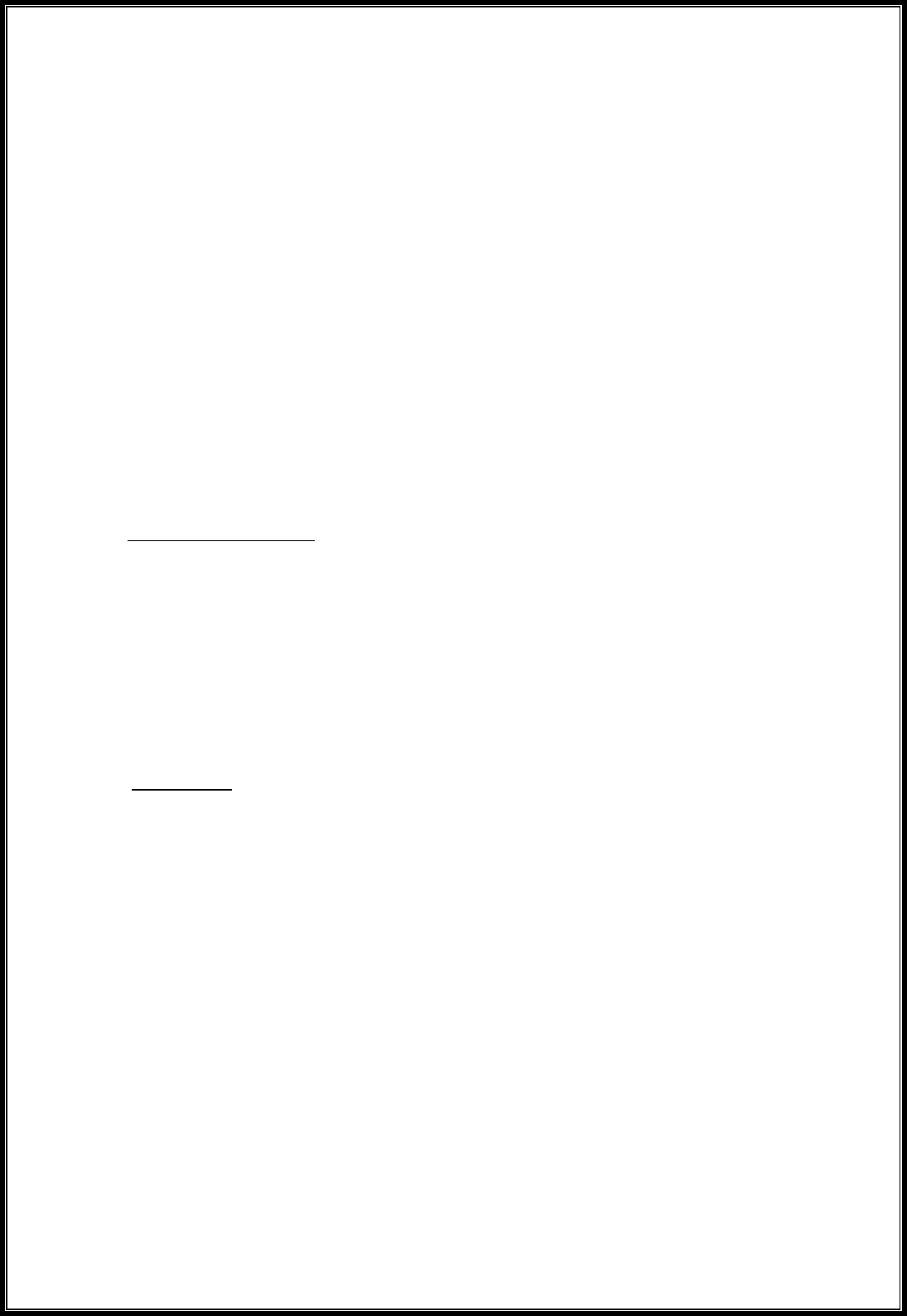
Scanned by CamScanner

Scanned by CamScanner

National Health Mission, UP.
HUMAN RESOURCE POLICY
FOR CONTRACTUAL STAFF
NHM- UP

National Health Mission, UP.
2
FOREWORD
The National Health Mission (NHM) was designed with the aim of providing accessible,
affordable, accountable, effective and reliable healthcare facilities in the rural areas of the
country, especially to the poor and vulnerable sections of the population. In the State of Uttar
Pradesh, National Health Mission has made special efforts for reaching out to the community
at grassroots level. Some of the initiatives taken in this direction include, creating IPHS
specified infrastructure and deploying recommended human resources. However, there is still
a huge gap that needs to be plugged, in order to have a strengthened system for effective
delivery of quality services to the patients. It has been observed that lack of skilled manpower
in health facilities dissuades patients from utilizing the available government health
infrastructure. Besides, community faces great hardships on approaching the private sector,
which puts enormous pressure on their already weak pockets.
The State Government has recently reduced user charges in hospitals and rural health centres
to a considerable extent. It has also made provisions for free medicines & investigation
services with a view to increase the utilization of services by the poor and marginalised
sections of the community. Despite such concerted efforts, the Government healthcare
system still lags far behind the private sector in terms of providing dignity and respect along
with prompt quality care to service seekers.
Given this backdrop, the need to deploy additional skilled human resources can hardly be
overemphasized. To be able to attract & retain the best available medical and paramedical
professionals, the State has envisaged a transparent recruitment process. A robust and well-
defined Human Resource Policy forms the basic pre-requisite for having a strengthened
system for addressing any staffing issues that may hamper the functioning of the system.
It is presumed that this HR Policy for the Contractual Staff of NHM will help attract skilled
personnel to join the Government healthcare system and will also motivate them to offer
quality services to the desiring community.
(Pankaj Kumar)
Mission Director,
NHM, UP

National Health Mission, UP.
3
MISSION
The Goal of the Mission is to improve the availability of
and access to quality health care by people,
especially for those residing in rural and slum areas,
the poor, women and children.

National Health Mission, UP.
4
INDEX
CHAPTER REGULATION PAGE NO.
1. INTRODUCTION & DEFINITION
a. Introduction 6
b. Definition 7-9
2. EMPLOYEE CLASSIFICATION
a. Employees clasification 10
3. HUMAN RESOURCES PLANNING
a. Introduction 11
b. Human Resources Planning 11
c. Planning Methodology 12-13
4. RECRUITMENT, OF CONTRACTUAL EMPLOYEES
a. Recruitment 14
b. Mode of Recruitment 14
c. Process of Recruitment 14
d. Letter of Appointment 14
e. Joining Procedure 14
f. Pre-requisite of joining 14
g. Commencement of Services (Rules and Duration of contract) 15
h. Contract Rules & Regulations 15-16
5. TRAINING & DEVELOPMENT
a. Objectives 17
b. Training & its Importance 17-18
c. Planning & Organization of Training 18
6. PERFORMANCE MANAGEMENT SYSTEM
a. Purpose 19
b. Performance Management Process 19
7. WORKING CONDITIONS
a. Hours of Operation/Work Schedules 20
b. Working Hours 20
c. Rest Intervals 21
d. Holidays 21
8. LEAVE FACILITIES
a. Casual Leave 22
b. Medical Leave 22
c. Maternity Leave 22
d. Paternity Leave 22-23

National Health Mission, UP.
5
9. GRIEVANCE REDRESSAL/DISCIPLINE
a. Redressal of Grievances 24
b. Discipline/Behaviour 24
c. Gender Sensitization 24
d. Investigation on Sexual Abuse to male/female contractual staff 24
e. Involvement in Strike/Demonstration 24
f. Political Activities 24
g. General Discipline 25
10. SEPRATION & EXIT FORMALITIES
a. Separation 26
b. Issue of Experience Certificate 26
c. Notice by the Individual 26
d. Separation Process Checklist 27
11. GENERAL GUIDELINES/STAFF CODE OF CONDUCT
a. Guidelines 28-29
12. MISCELLANEOUS
a. Other Rules 30
b. Group Insurance 30
c. Positions at NHM 30

National Health Mission, UP.
6
CHAPTER- 1
Introduction & Definition
1. Introduction
The Government of India launched the National Rural Health Mission (NRHM), considering the
importance of health in the process of economic and social development and improving the
quality of life of the citizens and to carry out necessary architectural correction in the basic
health care delivery system. The Mission adopts a synergistic approach by relating health to
determinants of good health viz. segments of nutrition, sanitation, hygiene and safe drinking
water. It also aims at mainstreaming the Indian systems of medicine to facilitate health care.
The Plan of Action includes increasing public expenditure on health, reducing regional
imbalance in health infrastructure, pooling resources, integration of organizational structures,
optimization of health manpower, decentralization and district management of health
programmes, community participation and ownership of assets, induction of management
and financial personnel into district health system, and operationalizing community health
centers into functional hospitals meeting Indian Public Health Standards in each Block of the
Country.
The Uttar Pradesh Government executes the same by entering into an agreement with the
Government of India. To run the various programmes under the State Health Society of Uttar
Pradesh as envisaged by GoI, Human Resource has been recruited on contract. To safeguard
the interests of the contractual employees and in the interest of the Mission a Human
Resource Policy has been designed, which shall remain effective on approval from the General
Body of the State Health Society.

National Health Mission, UP.
7
2-Definitions
The definitions given below in this chapter shall be of general application. Any definition in
any other Chapter of this Manual, which is not specifically, restricted either to a Chapter /
Regulation or to any stated purpose, shall also be of general application in this manual, unless
there is anything repugnant in the subject or content.
1. "State Health Society (SHS)" At the State level, the State Health Society would function
under the overall guidance of Chairman/Principal Secretary, Medical Health & Family
Welfare, GoUP & Mission Director, NHM, UP shall be the Secretary to the society.
2. "District Health Society (DHS)" At the District level, the District Health Society would
function under the overall guidance of Chairman/District Magistrate & Chief Medical
Officer, shall be the Secretary to the society.
3. "Appointing Authority" means
a) For State Health Society- Mission Director or any other person duly authorized
by the Mission Director, NHM, UP.
b) For District Health Society- District Health Society or any office bearer of DHS
duly authorized by DHS.
4. “Assembly" means a place where all employees, irrespective of cadre/post assemble
and discuss various aspects of UPNHM or any other matter that may be considered
appropriate.
5. "Attendance Register" means a register for marking daily attendance of employees, at
any office of National Health Mission, maintained under applicable local laws.
6. ""Manual" or "this Manual" means the HR Manual for contractual employees of
UPNHM.
7. “Confidential Information” shall mean UPNHM Information, Third Party Information,
Intellectual Property Rights, Proprietary Technique, Training Material and any and all
information relating to the UPNHM, including without limitation, financial results and
projections, costs and prices, details of suppliers, employees and consultants (past,
present or prospective), technologies, technical strategies, marketing, pricing and
other strategies, as well as any such information not generally known to third parties
or received from others, whether such information has been expressly designated as
confidential or otherwise, to which the Employee has or gains access to at any time
during the employment with the UPNHM or which is available to the Existing
Employee directly or indirectly, whether in writing, oral, graphic, visual or any other
tangible, intangible or electronic form.
8. "Competent Authority" means the Mission Director, NHM, UP or duly authorized
person by the State Health Society and District Magistrate or duly authorized person
by the District Health Society.
9. “Contractual Employee” means a person employed under a contract of employment.
10. “Contract of employment” means a written contract entered into between UPNHM
and employee employed for the purpose of performing certain specified work for a

National Health Mission, UP.
8
certain specified period and whose complete terms and conditions of employment are
contained in the written contract.
11. "Day" means a period of twenty four hours commencing from midnight.
12. "Delegation of Powers" refers to any powers that may be delegated by the Governing
Body/Mission Director to any committee or person, subject to restrictions and
conditions, if any.
13. "Existing Contractual Employee" means an employee presently in the employment of
UPNHM.
14. "Executive Committee" means a committee appointed by the Governing Body with
specific responsibilities and powers assigned thereto by the GB. Chairman is Principal
Secretary, Medical Health and Family Welfare, GoUP.
15. "Governing Body" of Uttar Pradesh National Health Mission. Chairman is Chief
Secretary, GoUP
16. "Head Office" means the office from where the general administration of the UPNHM
would be carried out and would include any administrative department or officer of
such Head Office, wherever located, in relation to the work of functions of such Head
Office.
17. “Honoraria” means remuneration including all fixed allowances paid / payable to a
contractual employee. Unless specifically mentioned, Honoraria would not include any
alowance/incentive that is variable in nature and is dependant on performance or such
other criteria. "Honoraria" shall also exclude all items that are by way of
reimbursement of any expenses.
18. “Intellectual Property Rights” shall mean all forms of intellectual property rights and
all analogous rights subsisting / recognized under the laws of India or any other
jurisdiction in the Territory and shall include without limitation any product or process
of the human intellect whether registrable as patents, trademarks, copyrights, designs
or otherwise such as an invention, expression or literary creation, unique name, trade
secret, working method, database, industrial process, computer program, source code,
process or presentation.
19. "MCI" means the Association of Medical Council of India.
20. "Management" means Principal Secretary – MH & FW/Mission Director- NHM or any
other person/s duly authorized in this behalf, by the Governing Body.
21. "Medical Certificate" means a certificate issued by a CMO/CMS/MOIC/Medical officer
or by any qualified registered medical practitioner.
22. "Calendar Month" shall mean a month as per the English Calendar.
23. "Calendar Year" shall mean from January to December.

National Health Mission, UP.
9
24. “Party” shall mean the organisation or the existing contractual employee referred to
individually, and “Parties” shall mean the organisation and the existing contractual
employee referred to collectively.
25. “Person” shall mean and include an individual, an association, a corporation, a
partnership, a joint venture, a trust, an unincorporated organisation, or other entity or
organization, including a government or political subdivision, or an agency or
instrumentality thereof and/or any other legal entity.
26. "Prescribed" or "Power Determined" means prescribed or determined by the Mission
Director or by a person duly authorized by him.
27. “Proprietary Technique” shall mean the technique which has been developed or
acquired by the UPNHM for developing better systems in respect of the organisation;
28. “Third Party Information” means confidential or proprietary information received or
to be received by the UPNHM from third parties.
29. “Training material” shall mean the material, in the form of documents, videos, books,
CDs or any other storage media whether electronic or otherwise containing
information regarding method and manner of performance of the services by the
Employee which would be made available to or which would be accessible by the
Employee during the course of his employment with the Organisation.
30. "UPNHM Information" shall mean any information that relates to the UP-NHM actual
or anticipated activities or research and development, technical data, Logo or know
how, including, but not limited to, research, or other information regarding the UP-
NHM.
31. "Week" means a period of seven days.
32. "Staff" means an employee.
33. “Financial Year" normally means a financial year followed by UP-NHM, which is
presently from First day of April to last day of March.

National Health Mission, UP.
10
CHAPTER -2
EMPLOYEE CLASSIFICATION
Classification of Employees:
1. Employees, irrespective of cadre or post shall be broadly classified into:
"Temporary" is a person who has been engaged for work which is essential of
temporary nature and likely to be finished within a limited period.
“Contractual Employee” means a person employed under a contract of
employment.
“Contract of employment” means a written contract entered into between the
UPNHM and an employee, employed for the purpose of performing certain
specified work for a certain specified period as mentioned in their “Service
Agreement” and whose complete terms and conditions of employment are
contained in the written contract.
"Designation" or "Cadre" shall have different meanings. "Cadre" shall normally
mean the grade or cadre as is internally assigned by the Government &
"Designation" shall normally mean the position that is externally made known.

National Health Mission, UP.
11
CHAPTER -3
HUMAN RESOURCES PLANNING
1 INTRODUCTION:
Human Resource is the most important resources in health care. Machines and
gadgets which are integral parts of health care require the human touch, expertise,
and commitment for their full utility and application in delivery of health care.
Therefore planning of human resources is the key to any health care provision. The
objective of UPNHM human resource (HR) policy is to attract, recruit, retain and
develop competent personnel and create a continuously learning health care
organization.
A. TARGET HUMAN RESOURCES IN PROGRAMME MANGEMENT UNIT (PMU)-
It further categories as follows-
SPMU (State Programme Management Unit) – The State Health Society is being
strengthened by State Programme Management Unit, which integrate all programme
activities at State level, headed by Mission Director,NHM, UP.
Div.PMU (Divisional Programme Management Unit)- The Divison is being
strengthened by Divisional Programme Management Unit, which integrate all
programme activities at Divisional level.
DPMU (District Programme Management Unit) - The District is being strengthened by
District Management Programme Unit, which integrate all programme activities at
District level and the State Health Society will be responsible for project management
in Districts.
BPMU (Block Programme Management Unit) – The District Health Society is being
strengthened by Block Programme Management Unit, which integrates all programme
activities in the Block and the District Health Society will be responsible for project
management in Blocks.
B. TARGET HUMAN RESOURCES IN HEALTH CARE (SERVICE DELIVERY)
The patient unquestionably is the focus of all health care personnel. While doctors,
nurses, hospital attendants, technologists, clinical assistants, para-medics and
pharmacists are directly involved in providing OPD and ward care, administration,
public relation, security, catering, laundry, electronics, civil, electrical and air
conditioning maintenance are involved in supporting the former for providing safe
health care.
2 HUMAN RESOURCE PLANNING
PURPOSE
Human Resource Planning is concerned not only to ensure appropriate levels of
staffing, but also to develop, implement and monitor effective personnel policies, to
satisfy the healthcare requirements and development needs of the future.
To relate Human Resource needs to the overall activities of the District Hospitals, Sub-

National Health Mission, UP.
12
District/ Divisional Hospitals, CHC’s, PHCs and Health and wellness centre/sub centres.
To make long-range estimations of specific as well as general HR needs.
To determine job titles and their numbers based on the requirement as per norms.
Planning Process
The number of employees to be taken will depend on the number of beds, type of
care, specializations and infrastructure planned. An acceptable bed to manpower ratio
will be taken into consideration to arrive at the number of personnel required. This is
with a view to ensure optimum utilization of human resources positioned at the
hospital.
The HR Planning process shall dependent on the following factors:
Number of Beds
Type of care Specialization
Infrastructure
Departmental structure
Type of services offered by respective department
The patient flow Future demand
Equipment in use
3 Planning Methodology
HR Planning involves two steps:
1. Determination of the quality of personnel needed.
2. Determination of the number of personnel needed.
Determination of the quality of personnel needed
This is the first stage in the process of identifying the skill set requirements. The process
of job analysis includes job description and job specification.
Job Analysis
This technique is used to determine the qualification, experience, skills, and job
responsibilities, required by the employee for successful performance of his / her job.
Job Analysis includes two functions,
Job Description - This sets out the purpose and functions of the job.
Job Specification - This defines the selection criteria (the knowledge, experience and
other Skills to look for when selecting the person to be offered the job).
Job Description
The job description should be an accurate and factual picture of the job to be filled, and
is a vital part of the process, providing the basic building block on which the person
specification, advertisement and selection process are constructed. The job description
sets out the task and the responsibilities of a position. This will also be useful for
identifying induction and training needs and will support the performance management
system.
Job Specification
The job specification is used as an aid to the short-listing process, and to assist fair

National Health Mission, UP.
13
selection of candidates in the interview process.
The purpose of specification is to provide an objective, comprehensive and detailed
description of the qualifications, experience, skills and abilities that an employee will
need to perform the job. The job specification must be written before any
advertisement is written and placed, as this will ensure that a consistent set of standards
are applied when the suitability of candidates is assessed.
The job specification sets out the criteria for selection against which all candidates will
be compared and measured. In the preparation of the job specification, the appointing
manager should ensure that criteria shown are objective, job related, clearly defined
and justifiable. The job specification forms a substantial part of the recruitment process.
Determination of the number of personnel needed
It is the determination of the number of personnel required by the organization for
carrying out the activities
The typical steps involved are,
Forecasting
Inventorying
Anticipating
Planning - is a multi-step process which takes into consideration the following,
Organizational objectives and plans
Functional Briefing
Determining overall human resources requirements
Inventory of present human resources, if any
Determining net human resources requirements
Action Plan for filling needs

National Health Mission, UP.
14
CHAPTER –4
Recruitment of Contractual Employees
1. Recruitment:
Recruitment is on the basis of UPNHM needs, suitability of candidate with respect to
qualification, experience, references and suitability to the position.
2. Mode of Recruitments-
There shall be three modes of recruitment namely:-
Directly on contract from open market.
Through outsource agency.
On deputation basis.
The process for recruitment shall be applicable to State Health Society & District Health
Society as implemented from time to time by Management.
3. Process of Recruitment:
The process of recruitment shall be done by State Health Society or District Health Society.
4. Letter of Appointment:
Every employee (except employee engage through outsource agency) at the time of
appointment shall be given a written order specifying such action. Such communication
would also include details of honoraria, designation, etc. All such communications shall be
signed by Mission Director, NHM or a person duly authorized by the Mission Director for
State Health Society & District Health Society or a person duly authorized by the DHS for
District Health Society.
5. Joining Procedure:
It will be mandatory for the contractual staff that she/he joins the place of posting within
30 days of getting the contractual/Offer letter order. If for any justified reason the
contractual employee is unable to join within the stipulated time then she/he has to get
written permission for extension of joining from competent authority. If she/he does not
join within the stipulated time then his candidature for the said post will automatically
stand cancelled.
6. Pre-requisite of Joining:
Character Certificate at the time of Contract – The person selected for the contractual
post shall submit a character certificate from a Gazetted officer at the time of joining.
Medical Checkup at the time of Contract – Before engaged in contract the selected
candidate has to produce a medical fitness certificate after the date of issuance of offer
letter from CMO/CMS/Medical Officers of Government hospitals on her/his own
expenses. The contract will be valid only if the selected candidate is medically fit.
The selected candidate has to produce following documents duly self attested along with
original documents for verification purposes before the signing of the contract:
1. High School Certificate/ Marksheet of (10+2) exam

National Health Mission, UP.
15
2. Marksheet of minimum educational qualification required, as specified, for particular
post.
3. Marksheet of minimum educational qualification desirable, as specified, for particular
post.
4. Graduate/Post Graduate Certificate from recognized University
5. Valid Caste Certificate from appropriate authority
6. Experience Certificate
7. NOC from previous employer, if applicable.
If the above mentioned certificates are not produced and on any stage after the
contractual engagement the documents submitted are found to be false then the contract
of the selected candidate shall be cancelled with initiation of legal action and registration
of First Information Report (FIR) against the candidate. After verification, if the documents
are found correct then the order for place of posting shall be issued from the competent
authority of National Health Mission, UP.
8. Commencement of Service: (Rules and Duration of contract)
The period of contract of the contractual employee shall be of one year commencing from
the date of signing of contract till 31
st
March of the financial year or till a regular employee
joins the said post. The contract period shall be for maximum of one year and after
appraisal of work and on satisfactory performance, the contract may be renewed subject
to the approval from Governement of India. There can be no claim on regularization on
the basis of contractual engagement.
The minimum performance benchmark as per GoI and any other standard added by
competent authority of State, shall be the basis of the contract of all the individuals
engaged under NHM. Compliance to the benchmarks performance indicators would
essential for renewal of contract of the incumbent.
Unless otherwise stated, the service of an employee shall be deemed to have commenced
from the forenoon of the day on which he reports for duty, in accordance with a letter of
appointment or a service agreement. On joining duty, every employee is expected to
submit a letter to the organization indicating the fact that he has joined for duty. The
letter must be countersigned by his superior and sent in original to Head Office. The
employee is also expected to comply with all the conditions stated in the appointment
order that may be a pre- requisite to employment (such as medical reports, previous
employers, noc, character certificate etc.)
9. Contract Rules & Regulations:
On getting the recruitment order, the contract should be signed between the contracted
employee and the appointing authority on a non-judicial stamp paper of Rs.100/- as
prescribed under the Stamp Registration Act. The contract will be executed between the
appointing authority of respective Health Society and the contractual employee. The
expenses so made in signing of contract shall be borne by the selected candidate. The
selected candidate will be considered joined on the place of posting on acceptance of
his/her joining by competent authority. Registration under Manav Sampada shall be

National Health Mission, UP.
16
mandatory on joining for maintaining service record and salary disbursement. She/he
will not be entitled to any travel/transportation allowance for joining duties.
On expiry of duration of contract and after appraisal of work and on satisfactory
performance, the contractual employee of National Health Mission, Uttar Pradesh will be
re-contracted for which again contract should be signed between the contracted employee
and the appointing authority on a non-judicial stamp paper as prescribed under the Stamp
Registration Act.
For working during the period of contract the contractual employee can not claim for
Pension, gratuity, Bonus or claim for any service under the Govt. of India or Govt. of Uttar
Pradesh or regularization of her/his services. The contractual employee can be called any
day in the interest of programme for the work even on holidays.
Recruitments of all the posts shall be made after the approval of the posts from
Government of India only. The honoraria for payment to the contractual employees shall
not exceed the approval given by GoI for the said post.
The relationship between the National Health Mission and contractual staff shall be as an
employer- employee.
The contractual employee shall get consolidated monthly honoraria against the services.
Incentives/allowances shall be applicable as per approval of GOI/State. However, this
cannot be claimed as a right if the management thinks that the individual performance was
not found up to the mark or any other adverse report received. After the contract it is
mandatory for the employee to reside at the place of posting.
The contractual employee has to actively take part in all the programmes/activity of
National Health Mission. Non-Participation in such programmes will be taken adversely. The
contractual employee should not engage in any criminal/unconstitutional/unethical activity.
If any employee engage in any criminal/unconstitutional/unethical activity then enquiry will
be setup, if he/her found guilty then appointing authority will terminate services of
employee. The contractual employee shall be in the administrative control of the appointing
authority.
During the period of contract the services of the employees can be terminated at anytime at
the option of the State Health Society/ District Health Society by giving her/him a notice of
one month or one month salary in lieu of such notice. Similarly, the employee can resign
from NHM during the period of the contract by giving one month notice or an amount equal
to one month salary in lieu of notice.
ID card will be provided by NHM, UP to all employees of NHM

National Health Mission, UP.
17
Chapter- 5
Training and Development
1- OBJECTIVES
To train and develop the resources of every employee by identifying the areas that needs to
be trained and developed and tuned towards achieving the overall goals and objectives of the
National Health Mission, Government of Uttar Pradesh.
1. To adapt a systematic procedure to identify the training needs.
2. To identify the specific training and development needs of employees.
3. To design, resource, deliver, monitor and evaluate training and development activities.
4. To review and report on training outcomes.
2- TRAINING AND ITS IMPORTANCE
Training is a learning experience that seeks a relatively permanent change in an individual that
will improve his/her ability to perform on the job. Training is the most important activity or
plays an important role in the development of human resources. To put the right man at the
right place with adequate training has now become essential in today's globalised market. No
organisation has a choice on whether or not to develop employees. Therefore training has
become an important "cutting edge" feature for maintaining and improving interpersonal and
intergroup collaboration.
Human resource is the life-blood of any organization. Only through well-trained personnel,
can an organization achieve its goals. At a glance, we find that training gives the following
results:
1. Growth, expansion and modernization cannot take place without trained manpower.
2. It increases productivity, reduces cost and finally enhances skill and knowledge of the
employee.
3. Prevents obsolescence.
4. Helps in developing a problem-solving attitude.
5. Gives people awareness of rules and procedures.
Moreover, structured, focused and monitored training ensures that the District
Hospitals/CHC/PHC/Sub Centre’s will seamlessly functions in the operational phase.
Induction Programmes
Induction Programme is given to the newly employed staff (doctors, nurses, technicians,
administrative staff etc.) and would include a series of lectures on various topics. The
induction programme introduces the employee to the Hospital about the general
functioning of the Hospital and would also include hospital rounds.
The Induction Programme provided would include:
Introduction to the National Health Mission
Organization structure
Role of various departments

National Health Mission, UP.
18
Importance of quality care and infection control
Communication and team work
Psychology of patient
Human values etc.
Need Based Training Programmes
The training is general to all departments and at all levels except for a few topics, which
are specific to executive and managerial cadre. These programmes are mainly aimed at
developing the behavioural aspects of individuals and will be more focused toward
employees who interact directly with the patient.
Technical Training Programmes
Technical training programmes consist of on-the-job training and would be given to the
technical employees of the health care system. The technical training programmes are
aimed at updating the technical skills and knowledge of the employees according to the
latest development in the fields. Technical training is generally given to the employees of
the medical, nursing and paramedical departments.
Internship with NHM, UP
The internship programme will provide an equal opportunity for the officers of the
National Rural and Urban Health Mission to interact with young thinkers with brilliant
academic record from reputed institutions.
3- PLANNING AND ORGANISATION OF TRAINING
Assessment of quality of staff-
There is always a need to ascertain the quality of manpower that is available. The training
needs of the staff can be determined only after ascertaining the quality of manpower
available. This is one area, which needs special emphasis because only after ascertaining
the training needs can specific training programmes for different category of staff is
planned. Hence it is imperative that the quality of staff is ascertained prior to scheduling
the training requirements.
Training Management Information System (TMIS) - A Systematic training plan & training
calendar shall be prepared for each health functionary, keeping in mind their training
needs. This could be maintained electronically as a TMIS & linked with HRMIS (Manav
Sampada).
Training calendar shall be prepared & publish by Training Division on yearly basis as per
the approval in RoP from Government of India.
Training for Capacity Building -
For capacity building of technical contractual employees, as per need, trainings will be
organized or they will be nominated from time to time.
If any contractual employee is provided special technical training then in such cases the
competent recruitment authority will have the right to engage the said employee for a
certain minimum period of time after training. For this a bond has to be filled by the
contractual employee undergoing special training in a given format or else the amount
spent in the said training will be recovered from the concerned contractual employee.

National Health Mission, UP.
19
Chapter 6
Performance Management System
1. Purpose:
The purpose of the performance management system is to assist the organisation, line of
working, and staff offices in meeting their goals and objectives by having in place a
systematic process designed to articulate individual (or team) standards, measure
employee performance, help each employee reach his/her full performance potential in his
or her current position.
2. Performance Management Process:
The performance Management Process is a consolidation and acknowledgement of
employee accomplishments and effectiveness throughout the performance cycle.
Provides an assessment of actual achievements based on the outcomes and expectations
contained in the performance plan.
Includes a synopsis of formal feedback received during the performance cycle.
Contains highlights of developmental activities undertaken during the period.
Work Appraisal:
For State Level Contractual employees
The work appraisal of all contractual employees at State Level shall be done bi-annually as per
the Appraisal Formats developed by the competent authority.
Appraisal of the all working staffs will be due from 01
st
of April and the process should be
completed by 15
th
of May.
For District Level Contractual employees
The work appraisal of all contractual employees at Block and District level shall be
done bi-annually as per the Appraisal Formats developed by the competent authority.
Appraisal of the all working staffs will be due from 01
st
of April and the process should
be completed by 15
th
of May.
The work appraisal of all contractual employees shall be based on the Performance Indicators
as framed by the State Health Society and Governement of India. The compiled appraisal for
State Health Society shall be approved by Mission Director and for District Health Society, it
shall be approved by any office bearer of DHS. After acceptance of the appraisal with
satisfactory performance, next year agreement will be executed.
Under the State Health Society and District Health Society, the increase in the honoraria shall
be subject to satisfactory acceptance of the appraisal. The increment in honoraria of
contractual employees shall be annually as approved by GoI on approval from Executive
Committee. Annual increment is not mandatory, only employee having satisfactory
performance will get annual increment. Management may deduct percentage of annual
increment of any employee based on the dissatisfactory performance. Annual increment
shall be applicable and due from the month of April and the newly recruited contractual
employee shall be eligible for the increment only after completing one year of service.
For future any fixation/changes in the basic monthly honoraria can be made after the
approval from GoI and the Executive Committee of NHM.

National Health Mission, UP.
20
Chapter 7
Working Conditions
1. Hours of Operation/Work Schedules
(I) Maintaining the attendance register is mandatory for all the offices of the NHM located
anywhere in Uttar Pradesh.
(II) Every employee shall be at work at the place and time as prescribed.
(III) Every employee is required to sign the register/biometric attendance at the time of arrival
to the office.
(IV) If any employee has to attend the meeting before the office hour then he/she has to
inform his reporting officer. In such cases, the employee is expected to sign the
attendance register/biometric attendance as soon as he reaches the office. If any
employee be on outdoor/outstation duty such fact shall be initiated to the office and the
attendance register shall be appropriately filled in (as “OD” i.e. On Duty) to ensure that
records are properly maintained.
(V) Absences and Lateness: Regular attendance is essential to UPNHM efficient operation and is
a necessary condition of employment.
(VI) Employees are expected to report to work as scheduled and on time. If it is impossible to
report for work as scheduled, employee must inform in writing their reporting officer
before the starting time. If the absence is to continue beyond the first day, the Employee
must notify their reporting officer on a daily basis unless otherwise arranged.
(VII) Each reporting officer is responsible for keeping accurate records of an Employee's
absences and of leave availed. UP-NHM may ask for medical examination or doctor's
certificate during or following an illness.
2. Working Hours:
The Standard
General Shift for Five Days Working : 09:30 a.m to 6:00 p.m
General Shift for Six Days Working : 10.00 a.m to 5:00 p.m
Rotation Duty : As applicable at Health Facilities.
At District Level – Six Days Working
Every Sunday & 2
nd
Saturday off (Weekly off).
At SPMU, Lucknow- Five Days Working (Every Sunday & Saturday weekly off)
The contractual employee can be called any day in the interest of programme for the work
even on holidays.
Dependant on Job Functions, the Management may allot different working hours based on
the exigencies of work.

National Health Mission, UP.
21
3. Lunch/Rest Interval:
Management may prescribe separate Lunch/Rest interval for separate employees so as to
ensure that continuous activity of the organisation does not suffer. Lunch/Rest intervals
shall not exceed thirty minutes.
Due to exigencies of work, the management reserves the right to call as many employees
as may be required, to work after the office hours, without any additional payment. This
is an integral part of the working conditions and terms of employment.
4. Holidays:
Management shall announce an annual list of Holidays for the succeeding year at the end
of every calendar year.

National Health Mission, UP.
22
Chapter – 8
Leave Facilities
1. Casual Leave:
All contractual employees will be eligible for Casual leave of 14 days in one calendar year
(Jan-Dec) and will not be sanctioned more than three working days in a row. For more
than three working days casual leave in a row, will be treated leave without pay.
Contractual employee has to take written permission before hand for station leave from
competent authority if leaving headquarter.
All casual leaves will lapse in the current calendar year and cannot be accumulated in next
calendar year.
2. Medical Leave:
All contractual employees will be eligible for Medical leave of 16 days in one calendar (Jan-
Dec) year. They have to produce medical fitness certificate from Gazetted Medical Officer
for more than three days medical leave in a row.
All unutilized (balance) medical leaves in a calendar year shall be carried forwarded and
accumulated in subsequent year upto 120 days in a service period of a contractual
employee.
3. Maternity Leave-
Contractual female employees shall be entitled for Maternity Leave of 180 days paid leave
as per “The Maternity Benefit Act – 1961” and modifications made thereafter in the act.
The Maternity Benefit Act -1961 was adopted by GoUP on 22-2-1974 and will be effective
in Uttar Pradesh from the said date. Maternity Leave will be treated as paid leave.
The Mission Director/ Additional Mission Director at SPMU. HQ shall have the sanctioning
power for leave without pay to contractual employees under special circumstances for
SPMU contractual employees. The same sanctioning power shall rest with DHS with
recommendation from CMO of concerned District.
4. Paternity Leave-
Contractual male employees shall be entitled for Paternity Leaves of 15 days before or up
to six months from the date of delivery of the child. If paternity leave is not taken within 6
months of the birth of child, it is treated as lapsed. Similar provisions are applicable on the
adoption of a child under the age of one year.Paternity Leave will be treated as paid leave.
Such leaves will be limited to 02 ocassions subjected to the maximum number of 02
living/surviving children. Prior approval must be taken from the Mission Director/
Additional Mission Director at SPMU. The same sanctioning power shall rest with DHS with
recommendation from CMO of concerned District.
Any weekly off’s/Holidays which may fall during the leave period may not be counted as
Paternity leave.
To avail Paternity leave, employee has to produce a medical certificate confirming
maternity of his wife, with valid proof of his wife’s name (Marriage Certificate or any other
Govt.authorized certificate).

National Health Mission, UP.
23
All leaves are subject to prior intimation and prior approval has to be obtained by the
concerned employee, from his competent authority. In cases where prior approval is not
possible (due to personal reasons), it is expected that the employee would inform the
competent authority and convey the reasons as well as likely duration of the absence from
the work over telephone / fax etc. On resuming duty, the employee shall forthwith submit a
suitable leave application to his competent authority.

National Health Mission, UP.
24
CHAPTER – 9
Grievance Redressal/Discipline
1. Redressal of Grievances:
The employer shall set up Grievance Settlement Committee for redressal of day to day
grievances of staff of the organisation.
2. Discipline/ Behaviour-
After the contract employee has been removed on the basis of complaints and investigation
he/she will not be entitled to be engaged in any post under NHM thereafter.
3. Gender Sensitisation-
No contractual employee will be engaged in any kind of sexual abuse to male/female
employees in the office.
The head of the division will ensure that such incidence does not occur in the office and take
appropriate measures to stop such incidence.
The following would come under sexual abuse:
Physical contact and sexual behavior
Request for agreeing to have sex
Sexual remarks
Showing obnoxious material/books which is abusive
Any other physical, verbal or signals which are of sexual nature.
4. Investigation on allegation of sexual abuse to male/female contractual staff –
Whenever complaints on sexual abuse is reported, investigation will be carried out by a
Committee headed by a senior level officer, in case of female victim 50% member would be
female officers.
The Committee so consituted will submit the report after investigation to the Head of the
institution/ organization/ society.
If any employee is found guilty in investigation, the SHS/DHS will have the power to take
disciplinary action against the same.
5. Involvement in strike/demonstrations -
No contractual employee shall indulge her/himself in any kind of strike/demonstration for
him/herself or in support of any other contractual staff.
If found in any such activity it would fall under the category of indiscipline and disciplinary
action would be initiated by competent authority.
6. Political Activities -
The following activities of the employees are prohibited:
To be an office bearer of a political party or an organization which takes part in politics;
To take part in or assist in any manner in any movement/agitation or demonstration of a
political nature;
To take part in an election to any legislature or local authority.

National Health Mission, UP.
25
No employee of the society shall engage himself / herself or participate in any demonstration,
strike, gherao and other agitation activities or abet, incite, instigate or act in furtherance
thereof.
7. General Discipline -
Every employee of the society shall at all times
• Maintain absolute integrity
• Maintain devotion of duty
• Do nothing which is unbecoming of the employee
• Conduct himself / herself in a manner conductive to the best interest, credit and prestige of
the society
Every employee of the society holding a managerial post shall take all possible steps to ensure
the integrity and devotion to duty of all employees for the time being under his/her control
and authority.
Grievance Redressal Committees (GRC) would be set up at District, Division and State levels
to address issues of the staff. The District GRC would resolve issues at the district levels,
whereas the Division GRC would tend to matters at the Division level. The GRC would
review the merits of the grievance brought to its notice and decide the action to be taken.
A written statement on the grievance would be submitted to the GRC by the staff. The GRC
would hold and hear both parties of the case and arrive at a conclusion and action to be
taken. If the staff is not satisfied with the resolution proposed, the staff can submit their
complaint to the GRC next in hierarchy.
There could be a possibility that the GRC may receive an anonymous grievance where the
concerned staff may not want to identify herself/himself. Such anonymous petition would
have to be in writing (email included) for further inquiry under this policy.
In due course of grievance redressal if any GRC finds that the grievance was filed due to
malice or mala fide intentions, the GRC or the nodal GR Officer might, as part of its Action
Taken report, recommend a warning to the staff concerned and recover the costs incurred if
any in connection with the grievance.

National Health Mission, UP.
26
CHAPTER – 10
Separation & Exit Formalities
Employee separation refers to when an employee leaves the organization.Separation occurs
when employment relationship officially ends. Employee separation happens for various
reasons. Organization also would initiate separation process due to budget crunch and other
changes in operational environment.
Policy Statements
1. The policy applies to all staff members including full-time and contractual staff.
2. Staff employment termination may be initiated at any time by either the employee or
by NHM in accordance with this policy.
3. Employees may be separated from employment voluntarily through resignation or
involuntarily through termination.
4. It will be the discretion of the management to make the relieving conditional to
clearance of pending work and/ or settlement of any large outstanding amount to the
organization.
5. Contract Employees are required to retire from service on attaining the age of 65
years.
6. Maximum age for employment shall be of 65 (Sixty Five) years of age. Relaxation for
employment above 65 years is granted for Doctors/ Medial Officers & Specialist posted
at health facilities which are subjected to their medical fitness.
1. Notice by the Individual
An employee should submit 01 month written notice to his/her supervisor before voluntarily
leaving UPNHM.
2. Termination of Service by Employer:
a. The Service of a contractual employee can be terminated as per provisions of the service
agreement or by giving one months notice in writing or by payment of equivalent amount
in lieu of the notice period. No such notice will be required where staff is dismissed for
misconduct after enquiry.
b. Reasons for termination of services of a contractual employee must in variable be
recorded in writing and the decision of the competent authority will be communicated to
the terminated employee in writing before he is discharged on any account.
c. In case the service of any employee is terminated or leaves the services, his dues shall be
settled as per rules.
d. An order of termination shall be in writing and shall be signed by the Appointing Authority
and a copy thereof be afforded to the terminated employee.
e. In all cases of discharge or dismissal of an employee he will obtain a clearance certificate
from the department/departments concerned certifying that nothing belonging to the
UPNHM is due against him. If the staff fails to return any such property, the cost of such
property shall be deducted from his wages.

National Health Mission, UP.
27
f. The Organisation has at all times a general right to discharge a employee after enquary
from service, not only for proved misconduct but also when the employer has bonafide
loss of confidence on the staff or for organisational reasons.
g. The Organisation may refuse to accept the resignation of a staff during the course of any
departmental proceedings against him, if the orgnization desires to continue with the
proceedings.
h. Where a staff has been convicted for a criminal offence in a Court of Law or where the
management is satisfied, for reasons to be recorded in writing, that it is inexpedient or
against the interest of security to continue to employ, the staff, may be removed or
dismissed immediately from the services without payment of salary in lieu of Notice
period with reasoned order on file.
i. The organisation may release an employee without insisting on notice period
compensation, at the discretion of the management.
Separation Process Checklist: After receiving intimation regarding Termination/Sepration of
staff follwiing shall be ensure by Division Heads:
a) Retrieve any NHM property such as: ID badge, access cards, keys, computer
equipment, mobile, etc.
b) Contact accounting to remove signature authority, if any.
c) Discuss and make arrangements with staff member for the disposal or collection of
any NHM information or NHM Licensed Software that maybe in his/her possession.
d) No dues formalities.
e) Final Settlement- Relieving letter and Employment certificate will be given soon after
the full and final settlement on the basis of completion of No Dues formalities. The
entire amount due to the employee will be paid with the subsequent month’s payroll.
3. Issue of Experience Certificate:
Experience Certificate shall be given to the employee who leaves services of the organisation
honorably.

National Health Mission, UP.
28
CHAPTER -11
General Guidelines/ Staff Code of Conduct
NHM provides enough space for the staff to perform at their best. NHM would be a learning
organization. NHM expects its staff to follow the code of conduct for work place hygiene. It
expects all staff to conduct themselves in an honest and ethical manner both in private and
public and act in the best interest of the NHM at all times. The staff are expected to
demonstrate good personal conduct through adherence to the following:
Avoid Conflict of Interest: Staff should avoid situations in which their personal interest could
conflict with the interest of NHM (eg. staff actively associated with the management of, or
hold financial interest in any business concern, accepting favours or a gift for any services
rendered by her/him on behalf of the NHM). Conflict if any, or potential conflict, must be
disclosed to higher management for guidance and action as appropriate.
Be Transparent & Accountable: All staff shall voluntarily ensure that their activities, with
regard to their conduct, in person and official transactions, are open to audit and follow the
highest norms of accountability.
Maintain Confidentiality: Staff should not disclose or use any confidential information gained
in the course of employment/association with NHM for personal gain or for the advantage of
any other person. No information either formally or informally shall be provided to the press,
other publicity media, social media or any other external agency except as per approved
policies of NHM.
Dress Code: While the NHM does not wish to limit the employee’s expressions of taste and
individuality, the staff must be aware what the employees wear to work is a reflection of the
employee’s own professionalism and that of NHM, UP. All employees should dress
appropriately for the type of service and their position in particular. In addition, certain
requirements must be observed. Clothing should be generally formal. A professional
appearance is important to the working and importance of all Organizations. Hence,
employees should dress with good taste and judgment and strive to keep up the sanctity of
the institution.
Use NHM Facilities judiciously: Staff should not misuse NHM facilities. In the use of such
official facilities, care shall be exercised to ensure the same with highest level of diligence.
Be Gender Sensitive NHM is committed to a gender friendly and a socially inclusive
workplace, with equal opportunities for men and women without any discrimination. All Staff
are expected to be gender sensitive and adopt non-discriminatory work practices, through
their Behaviour, beliefs, values and attitudes mainstreaming gender in the organization
culture.
Be Socially Inclusive: NHM staff should adopt an inclusive Behaviour towards all other
employees irrelevant to their caste, creed, etc. Staff is also expected to be sensitive towards

National Health Mission, UP.
29
the differently-abled colleagues, thus, creating a healthy work environment in the
organization.
Have no tolerance to Sexual Harassment: NHM is committed to a zero tolerance towards any
incident of sexual harassment.
Do not compromise the interests of NHM in dealing with other stakeholders: Staff should
ensure that in their dealings with all external agencies, including suppliers, vendors, partners,
etc., NHM’s interests are never compromised, or else it would be viewed as serious breach of
discipline and would attract disciplinary action.
Ensure Legal Compliance: All staff should comply fully with all applicable laws and regulations.
Adhere to Code of Conduct: Any instance of non-adherence to the Code of Conduct/any
other observed unethical Behaviour on the part of any staff should be brought to the
attention of the immediate reporting authority/ unit heads. The Management would be the
final authority to decide on such cases of non-adherence.

National Health Mission, UP.
30
CHAPTER -12
Miscellaneous
1. Other Rules-
The employment term for the contractual staff shall be from the age of 18 years upto
age of 65 years. Exemption shall be allowed for the medical officers and specialist
posted at health facilities to work after 65 years of age upto 70 years of age, subject to
medical fitness report issued by the Chief Medical Officer.
Contractual employee without the prior approval of competent
authority/direction/any confidential information should not share with any individual
or department in any form (written/verbal) and should not break the secrecy of the
office.
Contractual employee should obtain NOC (Non-Objection Certificate) from competent
authority before applying jobs on any other organization as well he/she should take
permission before applying/enrolling for any Educational/Technical course, otherwise
action may be taken against such employee .
The contractual employee during the period of engagement shall not work in any
other office/ institution and will be barred to be personally engaged in any other
service.
The contractual employee has to undertake all such work which has been assigned to
him/her from time to time.
After signing of agreement, if the contractual employee is found involved in any kind
of criminal offence, the competent authority will have the right to cancel the contract
of the contractual employee without giving him/her any notice.
If any contractual employee is found absconding from duties from office for more than
7 days, a show cause shall be issued to the concerned employee, if response is not
received in next 7 days from employee then the contract of the employee will
automatically stand cancelled from the date of his/her unauthorized absence.
For any kind of dispute between the contractual employee and employer, the local
court will have the jurisdiction for the same. After engagement on contract, if at any
time the contractual employee is found engaged in financial irregularities, destruction
of government/society properties and found guilty, the employer will have the right to
recover the said amount from the person found guilty and as per rules case will be
registered and appropriate action will be initiated against the person.
In the interest of work, the contractual employee will have to work on government
holidays also if the work so desires as per orders of the higher authorities. Under
unavoidable circumstances the leave/s can be cancelled by the competent officer.
2. Group Insurance
Contractual employees of National Health Mission, UP shall be entitled for group insurance as
implemented time to time on the basis of approval from Government of India.
3. Positions of NHM Positions of the contractual employees under NHM shall be as per the
approval of Government of India.
